- Home
- Mario Puzo
The Sicilian (v2.0) Page 2
The Sicilian (v2.0) Read online
Page 2
Suddenly he was aware of Inspector Velardi's cold blue eyes studying him. The thin aristocratic face was scornful, as if Michael had shown cowardice.
"Be patient," Don Croce said. "Our friend Andolini still serves as contact between me and Guiliano and his family. We will all reason together. When you leave here, you will visit Guiliano's father and mother in Montelepre, it is on your way to Trapani." He paused for a moment and smiled, a smile that did not break the massiveness of his cheeks. "I have been told of your plans. All of them." He said this with peculiar emphasis, but, Michael thought, he could not possibly know all the plans. The Godfather never told anyone all of anything.
Don Croce went on smoothly. "All of us who love Guiliano agree on two things. He can no longer stay in Sicily and he must emigrate to America. Inspector Velardi is in accord."
"That is strange even for Sicily," Michael said with a smile. "The Inspector is head of the Security Police sworn to capture Guiliano."
Don Croce laughed, a short mechanical laugh. "Who can understand Sicily? But this is simple. Rome prefers Guiliano happy in America, not screaming accusations from the witness cage in a Palermo court. It's all politics."
Michael was bewildered. He felt an acute discomfort. This was not going according to plan. "Why is it in Inspector Velardi's interest to have him escape? Guiliano dead is no danger."
Inspector Velardi answered in a contemptuous voice. "That would be my choice," he said. "But Don Croce loves him like a son."
Stefano Andolini stared at the Inspector malevolently. Father Beniamino ducked his head as he drank from his glass. But Don Croce said sternly to the Inspector, "We are all friends here, we must speak the truth to Michael. Guiliano holds a trump card. He has a diary he calls his Testament. In it he gives proofs that the government in Rome, certain officials, have helped him during his years of banditry, for purposes of their own, political purposes. If that document becomes public the Christian Democratic government would fall and we would have the Socialists and Communists ruling Italy. Inspector Velardi agrees with me that anything must be done to prevent that. So he is willing to help Guiliano escape with the Testament with the understanding that it will not be made public."
"Have you seen this Testament?" Michael asked. He wondered if his father knew about it. His instructions had never mentioned such a document.
"I know of its contents," Don Croce said.
Inspector Velardi said sharply, "If I could make the decision I would say kill Guiliano and be damned to his Testament."
Stefano Andolini glared at the Inspector with a look of hatred so naked and intense that for the first time Michael realized that here was a man almost as dangerous as Don Croce himself. Andolini said, "Guiliano will never surrender and you are not a good enough man to put him in his grave. You would be much wiser to look after yourself."
Don Croce raised his hand slowly and there was silence at the table. He spoke slowly to Michael, ignoring the others. "It may be I cannot keep my promise to your father to deliver Guiliano to you. Why Don Corleone concerns himself in this affair, I can't tell you. Be assured he has his reasons and that those reasons are good. But what can I do? This afternoon you go to Guiliano's parents, convince them their son must trust me and remind those dear people that it was I who had them released from prison." He paused for a moment. "Then perhaps we can help their son."
In his years of exile and hiding, Michael had developed an animal instinct for danger. He disliked Inspector Velardi, he feared the murderous Stefano Andolini, Father Beniamino gave him the creeps. But most of all Don Croce sent alarm signals clanging through his brain.
All the men at the table hushed their voices when they spoke to Don Croce, even his own brother, Father Beniamino. They leaned toward him with bowed heads waiting for his speech, they even stopped chewing their food. The servants circled around him as if he were a sun, the bodyguards scattered around the garden constantly kept their eyes on him, ready to spring forward at his command and tear everyone to pieces.
Michael said carefully, "Don Croce, I am here to follow your every wish."
The Don nodded his huge head in benediction, folded his well-shaped hands over his stomach and said in his powerful tenor voice, "We must be absolutely frank with each other. Tell me, what are your plans for Guiliano's escape? Speak to me as a son to his father."
Michael glanced quickly at Inspector Velardi. He would never speak frankly, before the head of the Security Police of Sicily. Don Croce understood immediately. "Inspector Velardi is completely guided by my advice," he said. "You may trust him as you do me."
Michael raised his glass of wine to drink. Over it he could see the guards watching them, spectators at a play. He could see Inspector Velardi grimace, not liking even the diplomacy of the Don's speech, the message being clear that Don Croce ruled him and his office. He saw the frown on the murderous huge-lipped face of Stefano Andolini. Only Father Beniamino refused to meet his gaze and bowed his head. Michael drank the glass of cloudy white wine and a servant immediately refilled it. Suddenly the garden seemed a dangerous place.
He knew in his bones that what Don Croce had said could not be true. Why should any of them at this table trust the head of the Security Police of Sicily? Would Guiliano? The history of Sicily was larded with treachery, Michael thought sourly; he remembered his dead wife. So why was Don Croce being so trustful? And why the massive security around him? Don Croce was the top man of the Mafia. He had the most powerful connections in Rome and indeed served as their unofficial deputy here in Sicily. Then what did Don Croce fear? It could only be Guiliano.
But the Don was watching. Michael tried to speak with the utmost sincerity. "My plans are simple. I am to wait in Trapani until Salvatore Guiliano is delivered to me. By you and your people. A fast ship will take us to Africa. We will of course have the necessary papers of identity. From Africa we fly to America where it has been arranged for us to enter without the usual formalities. I hope it will be as easy as they have made it sound." He paused for a moment. "Unless you have another counsel."
The Don sighed and drank from his glass. Then he fixed his eyes on Michael. He started to speak slowly and impressively. "Sicily is a tragic land," he said. "There is no trust. There is no order. Only violence and treachery in abundance. You look wary, my young friend, and you have every right. And so, too, our Guiliano. Let me tell you this: Turi Guiliano could not have survived without my protection; he and I have been two fingers on one hand. And now he thinks me his enemy. Ah, you can't know what sorrow this brings me. My only dream is that one day Turi Guiliano can return to his family and be acclaimed the champion of Sicily. He is a true Christian and a brave man. And with a heart so tender that he has won the love of every Sicilian." Don Croce paused and drank off a glass of wine. "But the tide has turned against him. He is alone in the mountains with barely a handful of men to face the army that Italy sends against him. And he has been betrayed at every turn. So he trusts no one, not even himself."
The Don looked at Michael for a moment very coldly. "If I were completely honest," he said, "if I did not love Guiliano so much, perhaps I would give advice I do not owe you. Perhaps I should say, in all fairness, go home to America without him. We are coming to the end of a tragedy which in no way concerns you." The Don paused for a moment and sighed again. "But of course, you are our only hope and I must beg you to stay and help our cause. I will assist in every way, I will never desert Guiliano." Don Croce raised his wineglass. "May he live a thousand years."
They all drank and Michael calculated. Did the Don want him to stay or to desert Guiliano? Stefano Andolini spoke. "Remember we have promised the parents of Guiliano that Michael will visit them in Montelepre."
"By all means," Don Croce said gently. "We must give his parents some hope."
Father Beniamino said with a too humble insistence, "And perhaps they will know something about the Testament."
Don Croce sighed. "Yes, Guiliano's Testament. He thinks it will save his
life or at least avenge his death." He spoke directly to Michael. "Remember this. Rome fears the Testament, but I do not. And tell his parents what is written on paper affects history. But not life. Life is a different history."
* * *
The road from Palermo to Montelepre was no more than a one-hour drive. But in that hour Michael and Andolini went from the civilization of a city to the primitive culture of the Sicilian countryside. Stefano Andolini drove the tiny Fiat, and in the afternoon sun his close-shaved cheeks and chin blazed with countless grains of scarlet hair roots. He drove carefully and slowly, as men do who have learned to drive motor vehicles late in life. The Fiat panted as if short of breath as it wound uphill through the enormous range of mountains.
At five different points they were stopped by roadblocks of the National Police, platoons of at least twelve men backed by an armored car bristling with machine guns. Andolini's papers got them through.
It was strange to Michael that the country could become so wild and primitive such a short distance from the great city of Palermo. They passed tiny villages of stone houses that were precariously balanced on steep slopes. These slopes were carefully gardened into terraced narrow fields growing neat rows of spiky green plants. Small hills were studded with countless huge white boulders half-buried in moss and bamboo stalks; in the distance they looked like vast unsculptured cemeteries.
At intervals along the road were holy shrines, padlocked wooden boxes that held statues of the Virgin Mary or some particular favored saint. At one of these shrines, Michael saw a woman on her knees praying, her husband sitting in their donkey-drawn cart guzzling a bottle of wine. The donkey's head drooped like a martyr's.
Stefano Andolini reached over to caress Michael's shoulder and said, "It does my heart good to see you, my dear cousin. Did you know that the Guilianos are related to us?"
Michael was sure this was a lie; there was something in that foxily red smile. "No," he said. "I only knew the parents worked for my father in America."
"As I did," Andolini said. "We helped build your father's house on Long Island. Old Guiliano was a fine bricklayer, and though your father offered him a place in the olive oil business, he stuck to his trade. He worked like a Negro for eighteen years and saved like a Jew. Then he came back to Sicily to live like an Englishman. But the war and Mussolini made their lire worthless and now he owns only his house and a small piece of land to farm. He curses the day he left America. They thought their little boy would grow up a prince and now he is a bandit."
The Fiat had stirred up a cloud of dust; alongside the road growths of prickly pears and bamboo had a ghostly appearance, the pears in their clusters seeming to form human hands. In the valleys they could see the olive groves and grapevines. Suddenly Andolini said, "Turi was conceived in America."
He saw Michael's questioning glance. "Yes, he was conceived in America but born in Sicily. A few months' wait and Turi would be an American citizen." He paused for a moment. "Turi always talks about that. Do you really think you can help him escape?"
"I don't know," Michael said. "After lunch with the Inspector and Don Croce, I don't know what anything means. Do they want me to help? My father said Don Croce would do so. He never mentioned the Inspector."
Andolini brushed back his thinning hair. Unconsciously his foot pressed down on the gas pedal and the Fiat scooted forward. "Guiliano and Don Croce are enemies now," he said. "But we have made plans without Don Croce. Turi and his parents count on you. They know your father has never been false to a friend."
Michael said, "And whose side are you on?"
Andolini sighed. "I fight for Guiliano," he said. "We have been comrades for the last five years and before that he spared my life. But I live in Sicily and so cannot defy Don Croce to his face. I walk a tight rope between the two, but I will never betray Guiliano."
Michael thought, What the hell was the man saying? Why couldn't he get a straight answer from any of them? Because this was Sicily, he thought. Sicilians had a horror of truth. Tyrants and Inquisitors had tortured them for the truth over thousands of years. The government in Rome with its legal forms demanded the truth. The priest in the confessional box commanded the truth under pain of everlasting hell. But truth was a source of power, a lever of control, why should anyone give it away?
He would have to find his own way, Michael thought, or perhaps abandon the mission and hurry home. He was on dangerous ground here, there was obviously some sort of vendetta between Guiliano and Don Croce and to be caught in the vortex of a Sicilian vendetta was suicidal. For the Sicilian believes that vengeance is the only true justice, and that it is always merciless. On this Catholic island, statues of a weeping Jesus in every home, Christian forgiveness was a contemptible refuge of the coward.
"Why did Guiliano and Don Croce become enemies?" Michael asked.
"Because of the tragedy at the Portella della Ginestra," Andolini said. "Two years ago. After that it was never the same. Guiliano blamed Don Croce."
Suddenly the car seemed to drop almost vertically, the road was descending out of the mountains into a valley. They passed the ruins of a Norman castle, built to terrorize the countryside nine hundred years ago and now crawling with harmless lizards and a few stray goats. Down below, Michael could see the town of Montelepre.
It was buried deep in the closely surrounding mountains as if it were a bucket hanging in the bottom of a well. It formed a perfect circle, there were no outlying houses, and the late afternoon sun bathed the stones of its walls with dark red fire. Now the Fiat was coasting down a narrow twisting street and Andolini braked it to a stop where a roadblock manned by a platoon of carabinieri barred their way. One motioned with his rifle for them to get out of the car.
Michael watched Andolini show his documents to the police. He saw the special red-bordered pass that he knew could only be issued by the Minister of Justice in Rome. Michael had one himself which he had been instructed to show only as a last resort. How did a man like Andolini get such a powerful document?
Then they were back in the car and rolling through the narrow streets of Montelepre, so narrow that if a car came from the opposite direction they could not pass each other. The houses all had elegant balconies and were painted different colors. Many were blue, a few less were white and there were some painted pink. A very few were yellow. At this time of the day the women were inside cooking dinner for their husbands. But no children were in the streets. Instead, each corner was patrolled by a pair of carabinieri. Montelepre looked like an occupied town under martial law. Only a few old men looked down from their balconies with faces of stone.
The Fiat stopped in front of a row of attached houses, one of which was painted a bright blue and had a gate in which the grillwork formed the letter "G." The gate was opened by a small wiry man of about sixty who wore an American suit, dark and striped, a white shirt and a black tie. This was Guiliano's father. He gave Andolini a quick but affectionate embrace. He patted Michael on the shoulder almost gratefully as he ushered them into the house.
Guiliano's father had the face of a man suffering the awaited death of a loved one terminally ill. It was obvious he was controlling his emotions very strictly, but his hand went up to his face as if to force his features to keep their shape. His body was rigid, moving stiffly, yet wavering slightly.
They entered a large sitting room, luxurious for a Sicilian home in this small town. Dominating the room was a huge enlargement of a photograph, too fuzzy to be recognizable, framed in oval cream-colored wood. Michael knew immediately this must be Salvatore Guiliano. Beneath, on a small round black table, was a votive light. On another table was a framed picture defined more clearly. Father, mother and son stood against a red curtain, the son with his arm possessively around his mother. Salvatore Guiliano looked directly into the camera, as if challenging it. The face was extraordinarily handsome, like that of a Grecian statue, the features a little heavy as though wrought in marble, the lips full and sensual, the eyes oval with half
-closed lids set wide apart. It was the face of a man without self-doubt, determined to impose himself upon the world. But what no one had prepared Michael for was the good-humored sweetness of that handsome face.
There were other pictures of him with his sisters and their husbands, but these were almost hidden on shadowy corner tables.
Guiliano's father led them into the kitchen. Guiliano's mother turned from the cooking stove to greet them. Maria Lombardo Guiliano looked much older than the photograph of her in the other room, indeed looked like some other woman. Her polite smile was like a rictus on the bone-set exhaustion of her face, her skin chapped and rough. Her hair was long and full over her shoulders but streaked with heavy ropes of gray. What was startling was her eyes. They were almost black with an impersonal hatred of this world that was crushing her and her son.

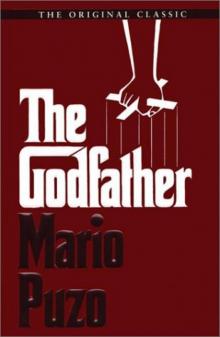 The Godfather
The Godfather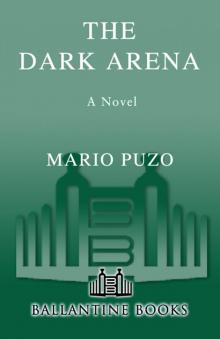 The Dark Arena
The Dark Arena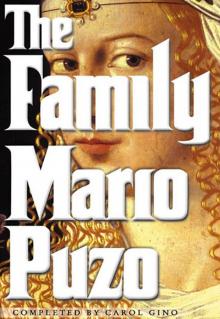 The Family
The Family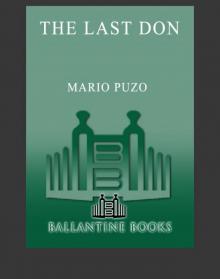 Last Don
Last Don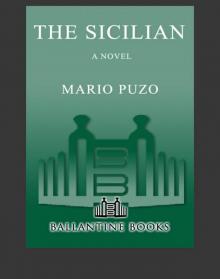 The Sicilian
The Sicilian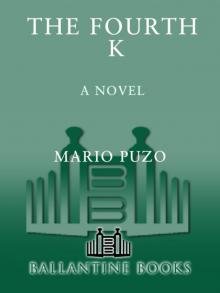 The Fourth K
The Fourth K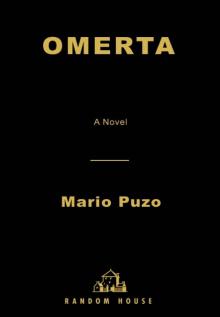 Omerta
Omerta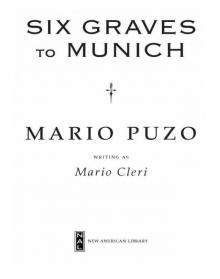 Six Graves to Munich
Six Graves to Munich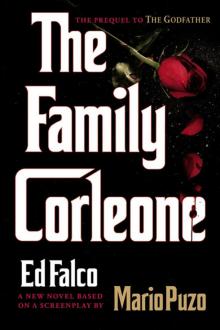 The Family Corleone
The Family Corleone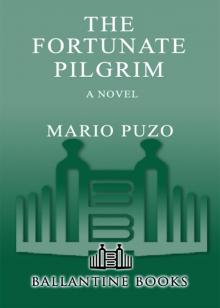 The Fortunate Pilgrim
The Fortunate Pilgrim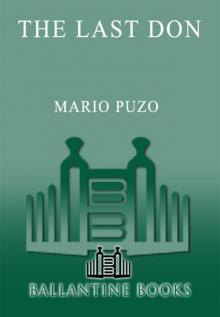 The Last Don
The Last Don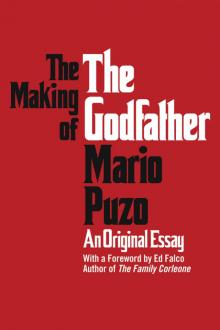 The Making of the Godfather
The Making of the Godfather Fools die
Fools die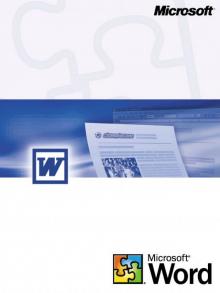 The Sicilian (v2.0)
The Sicilian (v2.0)